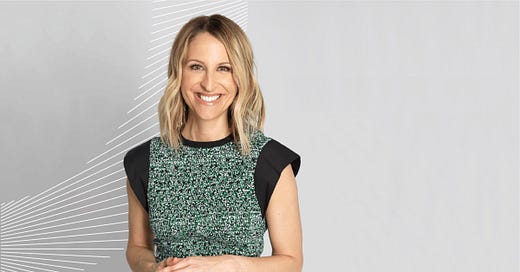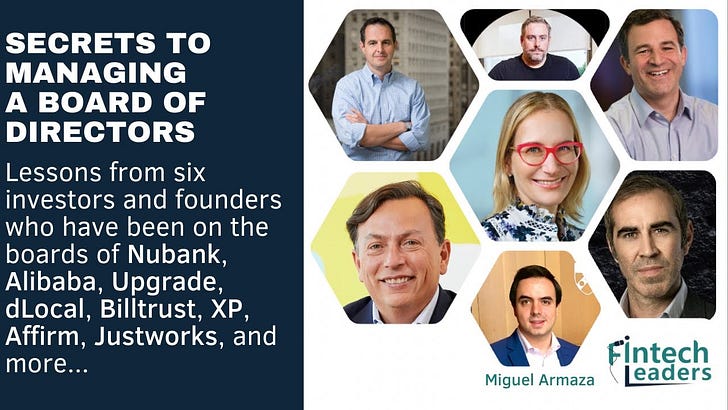This article is part of Fintech Leaders, a newsletter with 57,000+ dreamers, entrepreneurs, investors, and students of financial services. I invite you to share and sign up! And, if you enjoy this conversation, please consider leaving a review on Apple Podcasts, Spotify, or wherever you get your shows so more people can learn from it.
Today I sit down with Stephany Kirkpatrick, Founder/CEO of Orum, a fintech company that’s built a single API to enable US real-time and fast payments across RTP, FedNow, Same Day ACH, Wires, and more payment methods.
Launched in 2020, Orum has raised over $80 million from great fintech investors including Inspired Capital, Bain Capital Ventures, Clocktower, Acrew, Primary, and Accel.
In this episode, we discuss:
The future of real-time payments in the US and how Orum is helping increase adoption for small and mid-sized banks
"Nobody cares if that [Amazon] package gets to your front door through UPS, FedEx, Postal Service, or Amazon's blue vans… What you do care, is how timely it gets to your front door, and there's even a return feature if it doesn’t arrive in time. That's how I feel money movement should be. If it didn't arrive in time, I should get money back for that, as opposed to being charged a late fee by the bank."
Stephany envisions a future where money transfers are as reliable and customer-centric as Amazon's same-day delivery model. To get there, the industry needs to take a user-centric approach, where financial transactions are timely, and users could potentially be compensated rather than penalized for delays, shifting the accountability towards banks. Orum's foundational philosophy is to eliminate any single point of failure in the payment system. Stephany highlights the limitations of companies that connect directly to a single bank, often resulting in restricted money movement options. In contrast, Orum has built a multi-bank, multi-rail system that ensures flexibility, redundancy, and adaptability.
Why the risks posed by new technologies should not deter technological innovation
"I don't think fraud, or risk, or what could go wrong, should be the reason why we don't push incredibly big boundaries."
Innovation Over Fear: Stephany uses the example of Uber to emphasize that while every innovative platform can have risks, such as unfamiliar drivers knowing where users live, the overwhelming benefits often outweigh the risks. In Uber's case, turning a depreciating asset like a car into an income source was revolutionary enough to overcome initial apprehensions about the service.
Balancing Growth and Risk: With every groundbreaking innovation, there are bound to be challenges and downsides. In the world of payments, Venmo gave way for new security issues, where thieves could quickly transfer funds after physically taking someone's phone. Yet, these challenges did not halt the platform's trajectory because it addressed a crucial need. Being proactive in anticipating and addressing fraud, especially in the FinTech sector, is essential. Additionally, we must distinguish between actual risks associated with faster payments and pre-existing social engineering scams. It's vital to recognize the actual challenges and work collaboratively in the FinTech community, potentially even sharing data, to innovate and address them, maximizing the potential of next-generation financial tools.
Lessons learned from building an enterprise sales organization
Despite having industry-leading advisors and a strong background in consumer-facing sectors, Stephany encountered challenges in understanding and implementing effective B2B sales strategies. Even with guidance, the nuances of enterprise sales were initially foreign to her, illustrating the significant shift required when transitioning from consumer-focused sales. She quickly learned that companies servicing the financial services sector must be ready with elements such as self-audits and robust InfoSec practices. Historically, companies would worry about InfoSec after reaching substantial revenue milestones, but today, it's essential from inception. Also, rather than tackling customer queries on a case-by-case basis, Kirkpatrick learned the value of recognizing the general pain points of businesses and addressing them systematically throughout the sales process.
Asking for help and why founders should create a personal 9-1-1 call list… and a lot more!
"Of course we've stumbled. Of course we've made mistakes. Everybody has. Every company that you believe in today, they took some risks somewhere in the journey. And the only reason you believe in them and know about them today is because they bet it all."
Stephany advocates for a "9-1-1 list", a go-to list of experienced individuals that founders can call upon when faced with unfamiliar challenges. Seeking advice from those with more experience is not a sign of weakness; rather, it showcases wisdom and pragmatism. Reaching out to those who've been through similar trials can provide invaluable insights. Regardless of the specific niche or domain, all founders face common obstacles. Whether it's outgrowing a team member, handling a product outage, or facing a security breach, these challenges are inevitable. It’s paramount for founders to have open and honest conversations about these challenges, as shared experiences and solutions can be beneficial to all involved.
Want more podcast episodes? Join me and follow Fintech Leaders today on Apple, Spotify, or your favorite podcast app for weekly conversations with today’s global leaders that will dominate the 21st century in fintech, business, and beyond.
Previous Episodes You May Enjoy:
Video Highlights You Will Definitely Like:
Miguel Armaza is Co-Founder & Managing General Partner of Gilgamesh Ventures, a seed-stage investment fund focused on fintech in the Americas. He also hosts and writes the Fintech Leaders podcast and newsletter.


























Share this post